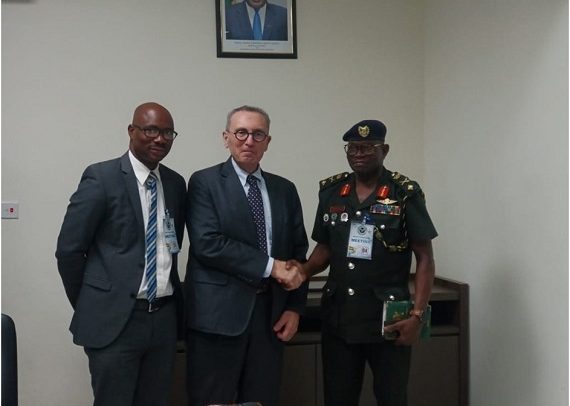Officials from GCERF and the Ministry of National Security at the presser
GHANA is set to receive about $3 million in funding from the Global Community Engagement and Resilience Fund (GCERF) to help in the country’s efforts at fighting terrorism and extremism.
This was announced at a joint press briefing between the Ministry of National Security and the GCERF in Accra by the Chairman of the governing board of GCERF, Stefano Manservisi.
In showing the Fund’s commitment to this cause, Ghana has consequently received an initial disbursement of $350,000 in emergency funding, while engagement with civil society organizations, donors and government are underway to develop an investment strategy for the country.
In his remarks, Mr. Manservisi intimated that the funding was aimed at complementing the government’s efforts in dealing with extremism and terrorism.
“We are starting this summer, and we are going to make an initial investment of $3 million, which will be very small grants to various local community-based organizations. We intend to continue that investment for the next 10 years with increasing amounts,” he announced.
According to him, the work of GCERF would lead to a wider and more direct engagement with communities impacted or facing threats of extremism, especially in the northern part of the country.
Chief Director of the Ministry of National Security, Ambassador Sena Siaw-Boateng, stressed on the need for enhanced efforts into Ghana’s fight against extremism, which he hinted was increasing n the sub-region.
“It is imperative that we address the pressing issue of terrorism and violent extremism that continues to plague our sub-region and now threatens to trickle down far south towards Ghana. The rise in terrorism in neighboring countries poses a significant threat to our national security and stability,” she stated.
Noting the need for collaborative efforts in the fight, the Ambassador Siaw-Boateng underscored the importance of employing softer means of dealing with the phenomenon.
“It is crucial that we recognize the interconnectedness of the threats, and we need a collaborative effort to be able to combat them effectively. We are also trying to prevent any radicalization of our citizenry in the border community areas.
We must employ non-kinetic approaches, that are the soft approaches, to address the root causes of these issues, including social, economic disparities, marginalization, and ideological grievances,” she added.
Executive Director of the West Africa Centre for Counter-Extremism, Muktar Mumuni Muktar, highlighted the threats of terrorism confronting Ghana, especially at the various border communities in Northern Ghana.
He highlighted factors such as religious clashes, chieftaincy and ethnic disputes, ethnic marginalization as some of the driving forces posing threats of terrorism in Ghana.
“The reason unresolved conflicts are a big driver or a big factor is that extremist groups are very exploitative. They take advantage of existing conflicts either to recruit or to aid in attacks,” he disclosed.
He, however, opined that some initiatives already being undertaken by the government of Ghana, including the ‘See Something, Say Something’ campaign are a great step at combating the menace while expressing belief that the GCERF support would help make such initiatives more effective in the battle against terrorism.
By Nii Adjei Mensahfio

